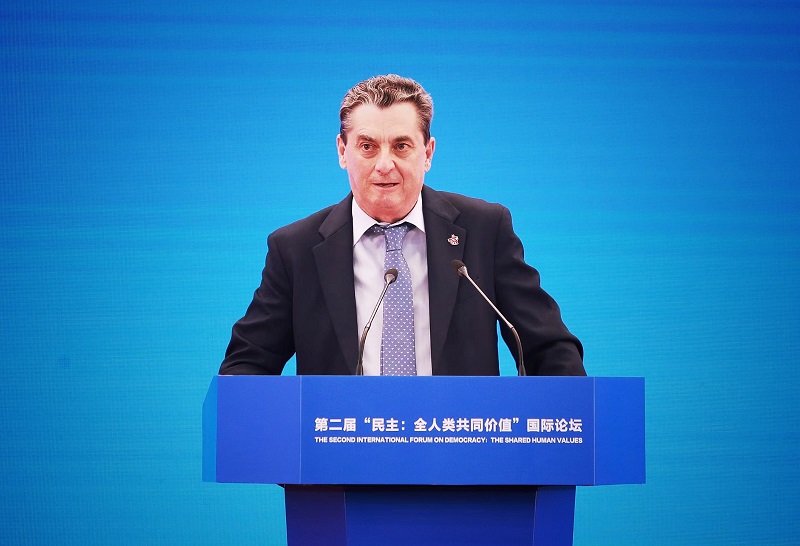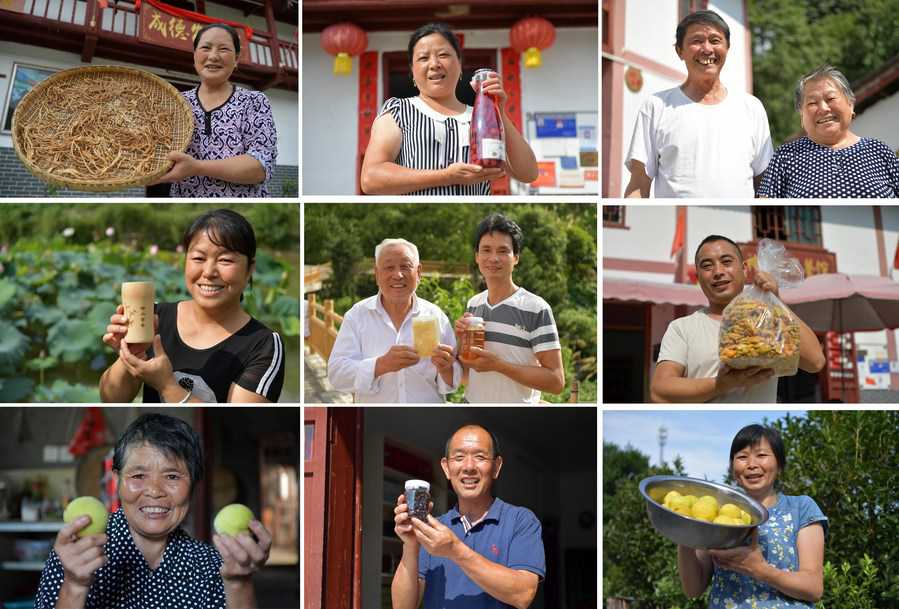Chinese Wisdom Inspiring the World

Democracy is a pluralistic concept. People should practice it in light of their country’s social conditions. There is not just one form of democracy in the world. As long as people support it, all forms of democracy should be respected.
“The proposal of building a community with a shared future for mankind is an important contribution of China to the world. It can help the world stave off conflicts and a possible Cold War, and steer the world towards a better future,” said José Luis Centella, president of the Communist Party of Spain, in an exclusive interview with China Today.
Invited by the International Department of the Communist Party of China Central Committee (IDCPC), Centella – leading a delegation consisting of representatives of Spain’s left-wing political parties, think tanks and media – visited China in March. He attended the Second International Forum on Democracy: The Shared Human Values on March 23 in Beijing. And on the same day, Centella sat down with China Today for an exclusive interview, sharing his views about the initiatives proposed by China and the country’s practices in promoting democracy.
China’s contribution to global development and progress
“A single flower does not make spring, while one hundred flowers in full blossom bring spring to the garden. As the future of all countries is closely connected, tolerance, coexistence, exchanges, and mutual learning among different civilizations play an irreplaceable role in advancing humanity’s modernization process and making the garden of world civilizations flourish,” observed Xi Jinping, general secretary of the Central Committee of the Communist Party of China (CPC) and Chinese president, in his keynote speech delivered at the CPC in Dialogue with World Political Parties High-level Meeting held on March 15. Xi then went on to propose the Global Civilization Initiative.
Centella indicated that the Global Civilization Initiative was put forward when the world is in jeopardy of being plunged into a dangerous situation. “The initiative proposed by Xi stresses that every civilization has its merit and deserves respect. It says ‘no’ to hegemony, and calls on countries to refrain from imposing their own values or models of civilizations on others. Civilizations need to cooperate with each other,” Centella told China Today.
He in particular emphasized the role of China in pushing for the political settlement of the Ukraine crisis, which is shrouding the world with the shadow of a possible nuclear war. “When two civilizations meet, if they can have an open mind, being inclusive, peace can exist. When they approach issues from the perspectives of other civilizations, then the world will be more wonderful and harmonious,” Centella observed.

The Global Civilization Initiative is a new contribution made by China to the international community, Centella pointed out. “The Communist Party of Spain espouses the initiative because we understand that to build a community with a shared future for mankind requires coexistence of different civilizations,” said Centella. He believes that diversified human civilizations need to seek the common goal of common prosperity of the whole world and happiness of all mankind.
The Belt and Road Initiative, together with the Global Development Initiative, the Global Security Initiative, and the Global Civilization Initiative forms an organic whole, holistically integrated and jointly advancing the building of a community with a shared future for mankind, Centella pointed out. He observed that without economic development, it would be also impossible for the world to realize peace and progress. “So, the Belt and Road Initiative has set up a great platform for economic cooperation, spurring development in countries along the routes,” Centella told China Today.
“The Chinese proposal of building a community with a shared future for mankind is guiding, advancing global development and progress. It inherits, advances, and enriches the purposes and principles of the UN Charter,” Centella said. He then emphasized that the world shouldn’t forget the ravages and sufferings brought about by a war. The UN Charter agreed upon by countries after World War II advocates that international problems should be addressed in a peaceful way based on respect for the principle of equal rights and self-determination of peoples, he observed. “The proposal of building a community with a shared future for mankind is inspiring the world for its future development,” he pointed out.
Chinese modernization: an exemplary model for democracy
Recalling his first visit to China more than a decade ago, Centella marveled at the huge transformation that manifests in China. “This is my seventh visit to China. I’ve witnessed how China has solved problems that have cropped up in its development, for example pollution control, protection of the natural environment, and the urban management problems caused by people’s mobility. Of course, the most impressive achievement made by China is the elimination of extreme poverty,” said Centella. He in particular highlighted the improvement of farmers’ livelihoods, benefiting from the country’s campaign of rural revitalization.
Talking about the huge progress China has achieved in many sectors over the past decade, Centella thinks China has set a great example for the world. “China’s great achievement in its urban development has not only been embodied in metropolises like Beijing and Shanghai, but also shown in those small and middle-sized cities. We can see, from streets, squares, parks, and stores, people enjoying their life, which means China has entered a moderately prosperous society,” he observed.
In terms of social progress, Centella noticed that there are ample numbers of Chinese women active in various fields with some of them in the top of the career hierarchy, and increasing numbers of young Chinese choosing to join the CPC. All this is helping shape a vibrant Chinese society and a vigorous Party. “What’s laudable about China is its pursuit of equality and common prosperity, which can make the country’s development achievements benefit everyone, thus avoiding negative social results brought by inequality,” he said.

Centella pointed out, “A fundamental principle of Chinese modernization is to put people at the center of the modernization. It’s people-oriented and serves the people.” He thinks China’s efforts in advancing rural development, improving health care and education, and extending the coverage of health insurance and compulsory education to all people have greatly raised people’s standard of living. “If only one percent of people in a country are able to enjoy modernization, that’s not true modernization. China’s pursuit is to make all people enjoy the benefits brought by modernization,” he said.
Meanwhile, technological innovation and industrial development have spearheaded and spurred Chinese modernization, a process involving all sectors of social life, Centella remarked. “I think China is setting a great example for the world in the 21st century in terms of how to fuel a country’s development and progress while avoiding widening the social gap, and not seeking hegemony,” he observed.
Democracy: the shared human values
Centella espoused the point that the form of democracy should be based on a country’s specific conditions, which China has advocated. “Democracy is a pluralistic concept. People should practice it in light of their country’s social conditions. There is not just one form of democracy in the world. As long as people support it, all forms of democracy should be respected,” he stressed.
In his opinion, the Second International Forum on Democracy: The Shared Human Values was convened at an apt time. “Today some countries intend to impose their version of democracy on others. We need to stop this,” Centella stressed.
He reiterated the point that was underscored in his speech at the forum, “If you don’t understand socialism with Chinese characteristics, you don’t get the Chinese way of democracy.” In his opinion, Chinese democracy is based on wide national consensus, which has involved as many people as possible in the country’s economic and social development, advanced Chinese modernization, and improved people’s lives in an all-round way, while strengthening the country’s solidarity and maintaining political stability.
Centella thinks that the Chinese model of democracy is suitable to the country’s social conditions. “China is a big country with a huge population and dozens of ethnic groups. Only if consensus can be reached, can a modernized country be achieved. Meanwhile, only if the development needs of different ethnic groups and regions are respected and met, and the rights to voicing opinions are respected, can consensus be reached,” he observed, and emphasized that Chinese democracy should be respected. “I think it’s the Chinese people’s right to safeguard and maintain their unique form of democracy,” he concluded.
 Facebook
Facebook
 Twitter
Twitter
 Linkedin
Linkedin
 Google +
Google +










